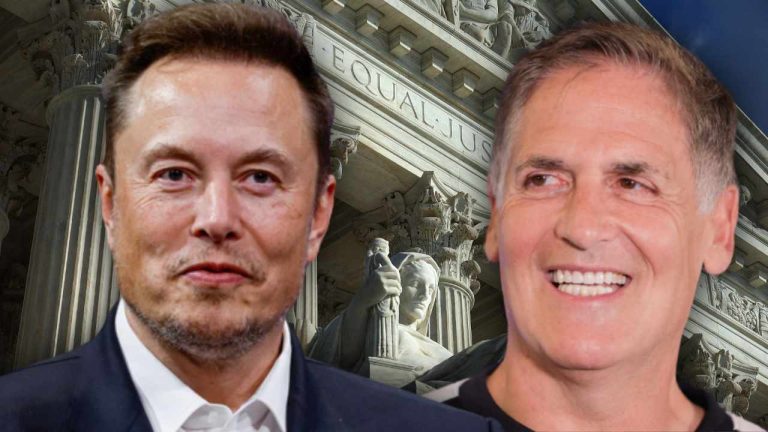Elon Musk, Mark Cuban Back Supreme Court Case Against SEC
Publikováno: 20.10.2023
 Tesla CEO Elon Musk and Dallas Mavericks owner Mark Cuban have jointly filed an amicus brief backing the defendants in a Supreme Court case against the U.S. Securities and Exchange Commission (SEC). “It is important that the SEC not be permitted to pick and choose whether parties are granted their constitutional right to jury trials […]
Tesla CEO Elon Musk and Dallas Mavericks owner Mark Cuban have jointly filed an amicus brief backing the defendants in a Supreme Court case against the U.S. Securities and Exchange Commission (SEC). “It is important that the SEC not be permitted to pick and choose whether parties are granted their constitutional right to jury trials […]

Tesla CEO Elon Musk and Dallas Mavericks owner Mark Cuban have jointly filed an amicus brief backing the defendants in a Supreme Court case against the U.S. Securities and Exchange Commission (SEC). “It is important that the SEC not be permitted to pick and choose whether parties are granted their constitutional right to jury trials or are forced to proceed in enforcement proceedings with administrative law judges immune from proper and meaningful oversight,” the lawyers for the billionaires stressed.
Elon Musk, Mark Cuban Back Case Against SEC
Tesla CEO Elon Musk, Dallas Mavericks owner Mark Cuban, and several others jointly filed an amicus brief to the Supreme Court on Wednesday, expressing support in a case that contests the validity of the U.S. Securities and Exchange Commission (SEC)’s administrative proceedings. The billionaires’ amicus brief was joined by Phillip Goldstein, Nelson Obus, Manouch Moshayedi, and the Investor Choice Advocates Network (ICAN).
The Supreme Court is scheduled to hear the SEC v. Jarkesy case on Nov. 29. The case challenges the constitutionality of the SEC’s use of in-house judges. Plaintiff George Jarkesy argued that the SEC’s internal, juryless adjudication process by a commission-appointed administrative law judge is unconstitutional because it violates his Seventh Amendment right to a trial by jury.
The amicus brief notes that the SEC began handling more cases internally between 2013 and 2014, after suffering “a series of jury trial losses in insider trading cases.” The filing states that amici have an interest in the outcome of this case because they believe:
It is important that the SEC not be permitted to pick and choose whether parties are granted their constitutional right to jury trials or are forced to proceed in enforcement proceedings with administrative law judges (ALJs) immune from proper and meaningful oversight.
“Unlike defendants in federal court proceedings, respondents in SEC administrative proceedings are not afforded the right to a jury trial or the benefits and protections of the federal rules of evidence and procedure,” the filing explains.
The Fifth Circuit Court of Appeals found in May 2022 that Jarkesy’s Seventh Amendment rights to a jury trial were violated. This ruling shortly followed the SEC acknowledging in April 2022 that its staff had improperly accessed documents in dozens of cases, including Jarkesy’s case.
Justice Department Solicitor General Elizabeth Prelogar contends the appeals court “erred in holding that Congress violated the Seventh Amendment by authorizing the SEC to bring administrative proceedings seeking civil penalties” and that the Supreme Court should reverse course. The Biden administration is asking the Supreme Court to overturn the ruling, stating that it could have “massive practical consequences” across the federal government if left intact.
The attorneys for Musk and Cuban asserted that the SEC “administrative proceedings — as they are currently structured — results in unequal results for SEC defendants.” They added:
The SEC’s insistence on administrative proceedings when federal court juries are readily available runs contrary to the SEC’s mission and harms the very investors and markets the SEC is charged with protecting.
“In the statutes and regulations the SEC is responsible for enforcing (as well as through its own actions, public statements, and admissions), the SEC demands full transparency and disclosure for the benefit of participants in securities markets,” the lawyers for Musk and Cuban described. However, the securities regulator “uses administrative proceedings, without the rigor and deliberation resulting from a jury trial, to litigate against defendants when the SEC could more efficiently and openly litigate in federal court,” they noted.
Moreover, they alleged: “When the SEC elects to use an administrative proceeding, whether before an ALJ or the commissioners of the SEC, the SEC itself is the sole fact finder and determines a respondent’s liability and punishment without the involvement of a jury.”
In conclusion, Musk, Cuban, and other amici “urge the court to affirm the Fifth Circuit’s decision but reverse its order of remand to the Commission,” the filing reveals. Their lawyers wrote:
Accordingly, amici … urge this court to endorse the Fifth Circuit’s reasoning to ensure that the SEC is required to appropriately litigate in all circuits, not just the Fifth Circuit.
Musk recently predicted a “comprehensive overhaul” of the SEC with 100% probability. The regulator sued the Tesla CEO this month to force him to testify about his acquisition of social media platform Twitter, now known as X.
What do you think about Elon Musk and Mark Cuban backing the Supreme Court case against the SEC’s administrative proceedings? Let us know in the comments section below.